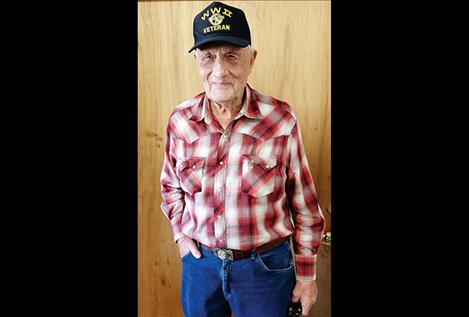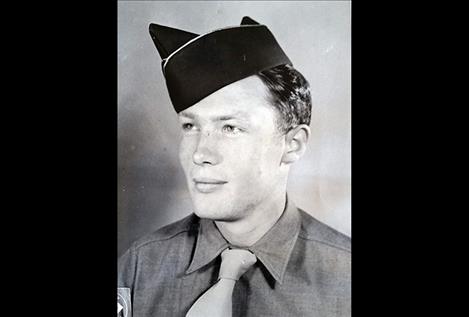Veteran Spotlight
George Stonehocker - January 15, 1926 WWII: 8th Army Infantry Training Battalion, Company B - U.S. Army
Hey savvy news reader! Thanks for choosing local.
You are now reading
1 of 3 free articles.
For a man who always wanted to remain a farmer, being drafted was not a welcome thing. George says it was like being ordered to volunteer. He had two or three farm deferments but somehow the local draft board official decided he should be drafted anyway. George was often seen driving a truck hauling milk from small local dairies to the cheese factory in Ronan. Maybe the official, who had a son in the military, thought that truck driving wasn’t really farming and that George should serve, too. George followed orders to go from Polson to Butte – he remembers the trip was the day after a tornado tore the roof off the Salish Hotel in Polson.
George was sworn in at Fort Douglas, Utah on July 7, 1945. He went by train to Camp Roberts, California, where he spent 21 weeks in basic and advanced weapons training. He was still in training when the bombs were dropped on Japan, which led to the end of WWII in the Pacific.
After basic training George got a furlough to go home for a couple of weeks, and then went to Camp Beale, an old army training post near Sacramento, California. He was there only for a short time with not much to do, and then went to Turlock Army Rehabilitation Center in California. Turlock Center was established to discipline and rehabilitate soldiers who violated military regulations before reinstating them for military duty. George worked as Officer’s Mess Boy. This particular duty was like a vacation to him. He says the officers ate very well, and so did he – steak every day and delicacies for Christmas. “I got fatter than a pig,” he recalled.
After a time, George was offered an opportunity to sign up for 12 months in the regular army followed by immediate discharge at the end of the 12 months. That sounded good to George, so he signed up and was discharged from the “draft army” and moved into the “regular army.”
After another furlough, George reported to Camp McQuaide on Monterey Bay, California, which was used as a stockade for army personnel who broke military rules. George remembers it being a beautiful site with the guard towers overlooking the surf. It was there that he saw the ocean for the first time. Algae suspended in the water provided a phosphorescent view. He was on the beach, looking out over the water, when a huge wave came in and he couldn’t outrun it. It knocked him down, soaked him and he lost his cap. “If I’m going to be in the water, I should have joined the Navy!”
George’s night duty was like being in a little box on top of a power pole watching over the 12-foot high barbed wire fenced prison compound. One night there was a riot over complaints about the food. The guys got bent out of shape, made lots of noise and burned three or four barracks. George and the other guards put down the riot just by threatening to use pick handles as clubs, and the guys were put back in what was left of their barracks. “The interesting thing,” George says, “is we ate with the prisoners because they ate better than we did.”
One time George was guarding some guys sent out during the day to police up the area. Two of them, taking a break said, “You wouldn’t really shoot us if we decided to walk out of here, would you?” George said, “Try it.” His 12-gauge shotgun got attention. George says, “I never had to hurt anybody, and I’m glad of that.”
George and a buddy heard the telephone office needed switchboard operators at night to relieve the civilian girls who worked during the day. Along with guard duty, he operated the switchboard and teletype machine, “Tough duty!” George says. He spent the extra money on bus fare to travel around California. He remembers the Monterey Centennial where he saw the first brand new Studebaker car. It had no running boards. George says it was a car ahead of its time.
George has definite opinions about the draft. He doesn’t think we should have it because he doesn’t believe our country’s leader should send our young people out, without their permission, to kill others. He would advise young people today, if they want to join the military, to serve as conscientious objectors. They can be medics as his son was in Vietnam.
George was discharged after his 12 months on Nov. 26, 1946 with the rank of PFC. He says, “I didn’t do anything very exciting. I just did what they wanted me to do.”
Thank you for your service, George.

















